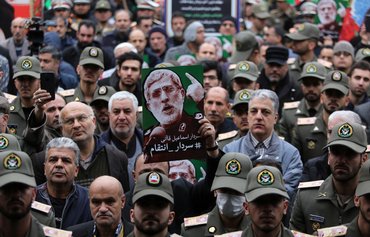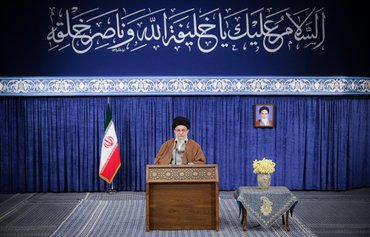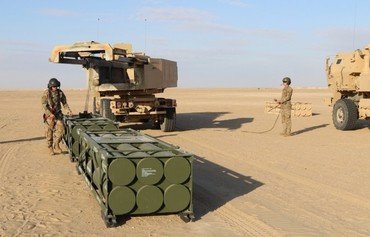There has been a notable decline in the performance of Iran's Islamic Revolutionary Guard Corps (IRGC) and its Quds Force, military experts and Iranian affairs researchers told Al-Mashareq.
Several IRGC arms-smuggling operations have been detected and thwarted in recent months, they said, and recent IRGC military manoeuvers carried out in Iran and its territorial waters have been poorly executed.
This can be attributed in part to US sanctions imposed on Iran, which have contributed to a clear decline in the areas of armament and logistics, they said.
It also can be attributed to widening popular resentment of the Iranian regime and the IRGC as a result of the regime's policies, they added.
As the country comes under increasing internal and external pressure, the IRGC has taken to rewarding its most loyal officers rather than the most qualified.
"Those who follow the IRGC's activities and undertakings are seeing a downward trend in terms of its performance and execution," Raad al-Hashem of Middle East Research Centre told Al-Mashareq.
This reflects its inability to keep pace with technological advancements, he said.
It seems that "US sanctions have cast a shadow on the structure of the regime as a whole and the structural organisation of the IRGC in particular", he said.
"The state of austerity and financial strangulation have caused [the regime and IRGC] to restrict many facets of their work, and reduced their chances of making any progress in their active operations," he added.
Recent reports "reveal failures and flubs in tactical exercises and operations carried out by the IRGC, which suggest that significant weakness and decline have beset the Iranian military establishment in general", he said.
Meanwhile, he added, the IRGC has been riddled with internal suspicions and allegations of corruption that are "weakening its efforts to perform at a level equal to the challenges it is facing".
Lacklustre performance
"It is clear that the IRGC has experienced decline, or let us say general weakness, owing to several factors," Iranian affairs expert Yousef Azizi told Al-Mashareq.
These include "US sanctions, which have rendered it unable to keep pace with the current advancements achieved by other countries in the region", he said.
For their part, the other countries of the region are taking a defensive stance against the IRGC's interventions and attacks, he said, noting that the Islamic Guard's expansionist ambitions far outstretch its current abilities.
The IRGC has over the past year conducted several large training exercises, which military experts and observers described as lacklustre in terms of performance.
One took place at the end of August in Iran's West Azerbaijan province, while an earlier exercise saw IRGC forces taking part in manoeuvers in Gulf waters and on the island of Qeshm, he said.
"Those who followed the exercises assessed both as being modest," and noted that the force's military equipment had become "antiquated" and its personnel "lagging in military advancements", Azizi said.
Loyalty over competence
The IRGC has been seen to be promoting senior officers based on their loyalty, rather than on their capabilities and qualifications, Iranian dissident and political activist Mohammad al-Kaabi told Al-Mashareq.
As the Iranian regime faces growing resentment among the Iranian people because of rising poverty, unemployment and vast expenditures on foreign wars, it has increased its emphasis on loyalty in the IRGC's ranks, he said.
This is particularly true of the IRGC's Quds Force, he noted.
To the Iranian people, he said, the IRGC is not seen as a security apparatus "as much as a weapon used against them, restricting their freedoms and draining public funds for wars that have nothing to do with them".
The Iranian regime senses this, and hence is keen to ensure that loyalty is rewarded through appointments to key positions with the IRGC and its Quds Force, as well as in the annual recruitment campaigns, he said.

![Deputy IRGC chief Ali Fadavi speaks to another member of the military during Basij Week in Tehran on November 24th. [Atta Kenare/AFP]](/cnmi_am/images/2019/12/06/21261-IRGC-Basij-week-600_384.jpg)






